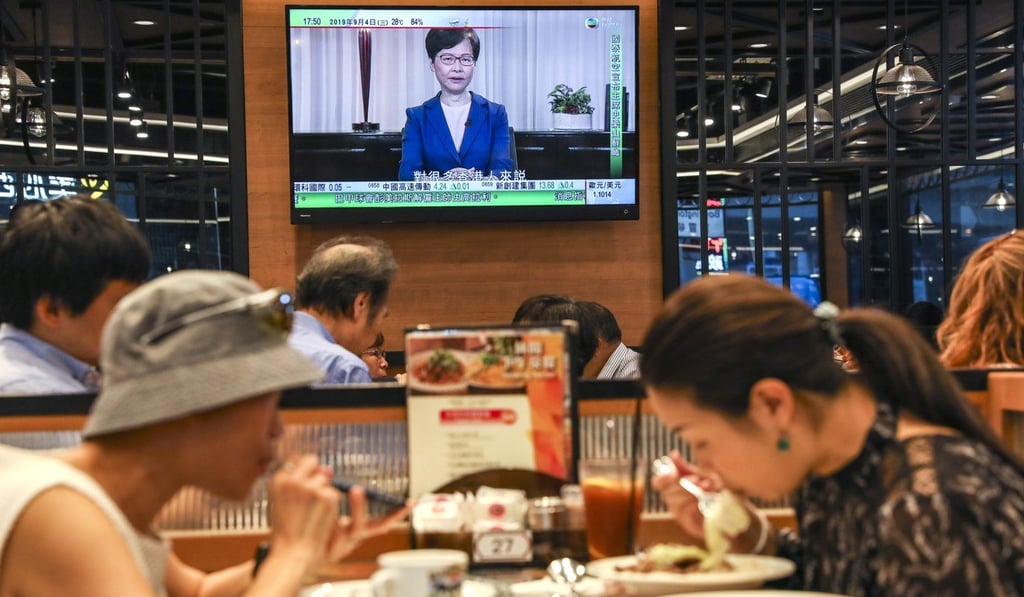
Exclusive | Hong Kong leader Carrie Lam sought Xi Jinping’s approval to formally withdraw extradition bill that triggered anti-government protests
- Revelation comes three weeks after chief executive said she had decided on her own to withdraw the legislation in bid to break the political impasse
- Source close to Hong Kong government says proposal was submitted to Xi’s office for deliberation and approval shortly before September 4 announcement
Hong Kong’s beleaguered leader, Chief Executive Carrie Lam Cheng Yuet-ngor, had to seek the approval of Chinese President Xi Jinping before she could formally withdraw her contentious extradition bill, sources have told the Post.
The revelation came three weeks after Lam said she had decided on her own initiative to withdraw the legislation in an attempt to start a dialogue with the public and break the current political impasse, and that Beijing understood and respected why the Hong Kong government had to do it.
A source close to the Hong Kong government said the plan to withdraw the bill had been submitted to Xi’s office for deliberation and approval soon before it was announced on September 4.
“The withdrawal of the bill is a crucial decision and, like appointments of principal officials in Hong Kong, it had to be approved by President Xi,” the source said.

“The Hong Kong government does not have much room to manoeuvre on options for handling the political crisis triggered by the bill as the central government considers it in the context of the US-China relationship. It’s no longer just a matter concerning the relationship between Hong Kong and the central government.”
In an audio recording leaked just days before her announcement, Lam was heard telling a group of businesspeople at a private gathering late last month that she had little choice, given that the massive backlash against the bill had been elevated “to a national level” and “to a sort of sovereignty and security level”.
Once that happened, for the chief executive, the “political room for manoeuvring is very, very, very limited”, she said, according to a transcript of her leaked remarks.
The decision was made by the Hong Kong government … The central government understands why we had to do it, they respected my views and they supported me all the way
Another source said from the perspective of national security, it was natural and logical for such crucial decisions to require Xi’s approval.
“It’s not an issue within the domain of the Hong Kong government,” the second source said.
Lam gave in to public demands and announced on September 4 that she would formally withdraw the bill that sparked the city’s protest crisis in June over concerns about allowing the transfer of criminal suspects to mainland China.
“The decision was made by the Hong Kong government … The central government understands why we had to do it, they respected my views and they supported me all the way,” Lam said the following day.
She had originally suspended the bill and then declared it to be “dead”, but refused to withdraw it, despite mass protests and violence.
The protesters are still insisting on four remaining demands: a commission of inquiry to investigate police conduct in tackling the protests; amnesty for those arrested; an end to characterising the protests as riots; and restarting the city’s stalled political reform process.
Lam insisted the bill’s suspension was to signal the government’s intention – to close existing legislative loopholes to go after criminals who were treating the city as a safe haven – remained a worthy and legitimate goal.
On July 9, the embattled chief executive declared the bill to be “dead”, stressing there was not a chance it would be tabled.
A week before her big climbdown, she said she would not accept any of the protesters’ demands, including the withdrawal of the controversial legislation.
The U-turn on September 4 came a day after Xi named Hong Kong, Macau and Taiwan as a major risk and challenge for the Communist Party. The designation came in a speech to officials during which the president listed a number of challenges facing the country.
“The president was referring to the general situation while the decision to withdraw the bill was a specific step taken to deal with specific instance,” the second source said.
A government source said the local administration normally submitted reports to Beijing through the State Council’s Hong Kong and Macau Affairs Office or Beijing’s liaison office in Hong Kong.
The two offices would subsequently relay the Hong Kong government’s reports to the office of the Communist Party’s Hong Kong and Macau affairs central coordination group, which is chaired by Vice-Premier Han Zheng. Reports concerning important issues are submitted to Xi’s office.

